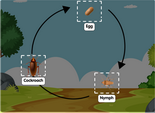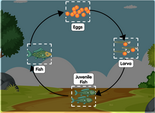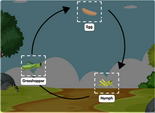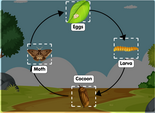Interactive Science Diagrams For Children Online
This page contains interactive science diagrams for children online. Each activity contains a science diagram to label the parts by dragging and dropping each label in the right location. These diagrams can be used to study in the classroom and at home. After mastering the anatomy of each organ on the diagrams, it is time to research about their functions. These activities eliminate the hassle of printing out worksheets. Our approach here is environmentally friendly. Try these out and tell us what you think. Diagrams for science | diagrams for science |
Animal cell diagram
Label the diagram of an animal cell game and worksheet for children.
Fish diagram
Label parts of a fish diagram for children. Drag and drop worksheet game online.
Frog diagram
Frog diagram labelled - interactive online game quiz. Worksheet on frog diagram.
Leaf diagram
Leaf cross section diagram - Label the parts of a leaf with drag and drop.
Lung diagram
Human lungs diagram for children. Learn to label the parts of a human lung.
Plant cell diagrams
Label the parts on a plant cell diagram through an interactive worksheet game.
Skin diagram
Labelled digram of a skin for kids - Online game on labelling skin diagram.
Plant diagram labels
| This page features
interactive science diagrams for children
online. Children will learn how to draw and label the following types of diagrams:
physics diagrams
,
easy science diagrams
,
biology diagrams
,
geography diagrams
and more. These
science diagrams
are similar to those you will find displayed in worksheets with arrows pointing to parts of the unit and children being asked to label the diagrams. The difference here is that children will do all of these activities online in an interactive drag and drop format. When children drag and drop each label, they will observe to see if they got it right by clicking the check button. Each diagram also gives you the possibility to check the correct labels before starting the process. Hence, these diagrams are the best tool every k-12 (primary school) teacher will ever need for their classroom activities. Parents will also find these useful for preparing their children ahead of any exam.
The diagrams are drag and drop labelling diagrams allowing for multiple attempts. If you label a diagram correctly and submit, it will be validated automatically. These diagrams are also like science games and teachers can use them as group games in the classroom to test and see how good students are in labelling science diagrams.
Children will learn with the interactive
heart diagram
labeled by dragging and dropping the following parts: pulmonary valve, superior vena cava, aortic valve, right and left ventricles, right atrium, left atrium and more. There is also the simplified
human digestive system
diagram to label. In it, children will label the following parts: esophagus, stomach, large and small intestine, liver, epiglottis, pancreas etc. This diagram actually shows us the parts of our gut that process food from when we ingest it to when we release waste in the form of feces.
This page also contains the
human excretory system diagram
in which students are asked to drag and drop labels of different parts that constitute this organ such as: the urethra, urinary bladder, right and left kidneys, renal artery, renal vein, and more. Think about it; when you drink water or tea, it goes through the body with some of it being absorbed while the other exits the body as urine. The excretory system actually takes care of all the processes involved from when you drink water to when part of it exits your body.
Also check out the interactive
male reproductive system diagram
to label. In this diagram, students are required to label the diagram with the following parts: urethra, penis, testes, scrotum, prostate, anus, rectum, Vas deferens, seminal vesicle and more. This diagram is simplified; after gaining a mastery of the parts of this organ, try to understand the role it plays in the functioning of the human body.
There is also a
human brain diagram
to label. Students will drag and drop the following parts to complete a
labelled diagram of the human brain
. The parts here include: the cerebrum, cerebellum, brainstem, medula, cerebral cortex, corpus colosseum and more. Our brain is vital for our existence and all decisions we take emanate from processes within it. Humans are smarter than other organisms because of the way their brains function. Each part of the brain coordinates a different type of activity; for example feelings are controlled by a different part from what coordinates taste.
Also check out the
animal cell diagram labeled
online. Children will learn different parts of a cell in a drag and drop diagram as follows: nucleus, vacuole, golgi body, cell membrane, cytoplasm, lysosome, ribosomes and more. A cell is the basic unit of life and in itself functions as a unit of its own with each part playing a specific role. That is why some organisms exist as unicellular organisms; which means they only have one cell. Humans on the other hand constitute billions of cells. A
plant cell and animal cell diagram labelling
exercise teaches us that both cells have a few similarities. The differences come in with the presence of a cell wall in plants. Children will label both diagrams in this exercise.
The
eye diagram labeled
through the activity in this page features parts like the iris, lens, cornea, optic nerve, fovea, sclera etc. The eye is the organ that enables us to see. It is part of the five senses. Children will be excited when they learn about the parts of the eye and their functions.
There are more activities involving science diagrams to label besides organs shown earlier. There is also a
water cycle diagram for kids
to label. This cycle is also called the hydrological cycle. In this exercise, students will drag and drop the labels of the different processes from evaporation, condensation, precipitation, runoff, infiltration, storage and back to evaporation. It is considered a cycle because it never stops. What this diagram suggests is that water never really escapes the Earth’s surface but rather goes around in a cycle. Another geography diagram here is the volcano. Children are asked to label parts of a volcano starting from the chamber from below where molten rocks originate to the vents through which it arrives on the Earth’s surface. There are several active volcanoes around the world; it will be interesting to understand how they come about.
These diagrams are online, interactive and fun. It saves teachers and parents the hassle of having to print out worksheets online each time. The added benefit of doing multiple attempts without restrictions makes these diagrams one of the best science resources out there for teachers. Keep coming back for more and remember to share. 1st grade | 2nd grade | 3rd grade | 4th grade | 5th grade | 6th grade



















































